现在分词与定语从句转换-推荐下载
高考重难点语法-定语从句和分词短语的转化
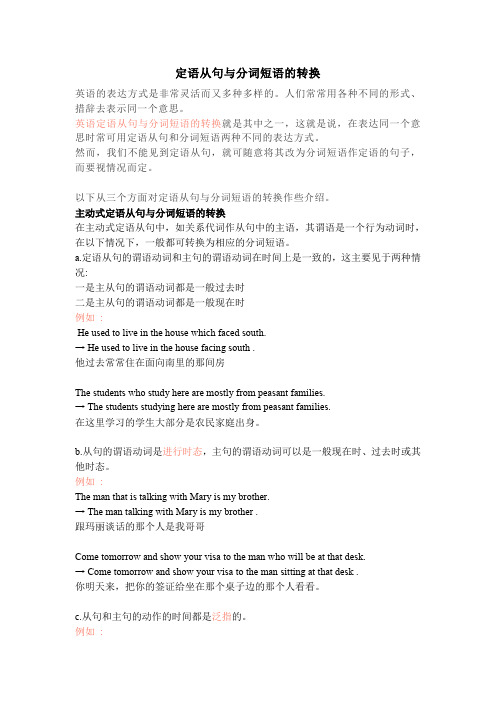
定语从句与分词短语的转换英语的表达方式是非常灵活而又多种多样的。
人们常常用各种不同的形式、措辞去表示同一个意思。
英语定语从句与分词短语的转换就是其中之一,这就是说,在表达同一个意思时常可用定语从句和分词短语两种不同的表达方式。
然而,我们不能见到定语从句,就可随意将其改为分词短语作定语的句子,而要视情况而定。
以下从三个方面对定语从句与分词短语的转换作些介绍。
主动式定语从句与分词短语的转换在主动式定语从句中,如关系代词作从句中的主语,其谓语是一个行为动词时,在以下情况下,一般都可转换为相应的分词短语。
a.定语从句的谓语动词和主句的谓语动词在时间上是一致的,这主要见于两种情况:一是主从句的谓语动词都是一般过去时二是主从句的谓语动词都是一般现在时例如:He used to live in the house which faced south.→ He used to live in the house facing south .他过去常常住在面向南里的那间房The students who study here are mostly from peasant families.→ The students studying here are mostly from peasant families.在这里学习的学生大部分是农民家庭出身。
b.从句的谓语动词是进行时态,主句的谓语动词可以是一般现在时、过去时或其他时态。
例如:The man that is talking with Mary is my brother.→ The man talkin g with Mary is my brother .跟玛丽谈话的那个人是我哥哥Come tomorrow and show your visa to the man who will be at that desk.→ Come tomorrow and show your visa to the man sitting at that desk .你明天来,把你的签证给坐在那个桌子边的那个人看看。
高一英语现在分词短语转定语从句练习题30题

高一英语现在分词短语转定语从句练习题30题1.The boy standing by the window is Tom.A.stands by the windowB.stood by the windowC.who stands by the windowD.who standing by the window答案:C。
现在分词短语“standing by the window”可以转换为定语从句“who stands by the window”。
A 选项缺少关系代词且谓语形式错误;B 选项时态错误;D 选项缺少谓语动词。
2.The girl singing in the classroom is Lily.A.sings in the classroomB.who sing in the classroomC.who sings in the classroomD.sang in the classroom答案:C。
“singing in the classroom”可转换为“who sings in the classroom”。
A 选项缺少关系代词且谓语形式错误;B 选项主谓不一致;D 选项时态错误。
3.The students playing basketball on the playground are very happy.A.play basketball on the playgroundB.who play basketball on the playgroundC.who playing basketball on the playgroundD.played basketball on the playground答案:B。
“playing basketball on the playground”转换为“who play basketball on the playground”。
高一英语现在分词短语转定语从句练习题40题(答案解析)

高一英语现在分词短语转定语从句练习题40题(答案解析)1.The boy standing by the window is my classmate.The boy who is standing by the window is my classmate.答案解析:这句话中“standing by the window”是现在分词短语作后置定语,修饰“boy”。
转换为定语从句时,关系代词“who”指代先行词“boy”,“is standing”是谓语动词。
A 选项正确。
其他选项没有这个用法。
2.The girl singing in the classroom is very beautiful.The girl who is singing in the classroom is very beautiful.答案解析:“singing in the classroom”是现在分词短语作后置定语修饰“girl”。
转换为定语从句时,“who”指代“girl”,“is singing”是谓语动词。
A 选项正确。
其他选项没有这个用法。
3.The students playing basketball on the playground are having a great time.The students who are playing basketball on the playground are having a great time.答案解析:“playing basketball on the playground”是现在分词短语作后置定语修饰“students”。
转换为定语从句时,“who”指代“students”,“are playing”是谓语动词。
A 选项正确。
其他选项没有这个用法。
4.The teacher teaching us English is very kind.The teacher who is teaching us English is very kind.答案解析:“teaching us English”是现在分词短语作后置定语修饰“teacher”。
定语从句与定语或状语间的转化
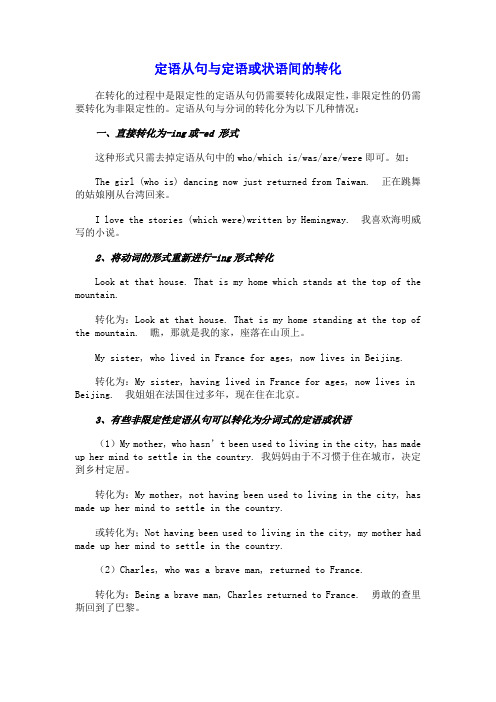
定语从句与定语或状语间的转化在转化的过程中是限定性的定语从句仍需要转化成限定性,非限定性的仍需要转化为非限定性的。
定语从句与分词的转化分为以下几种情况:一、直接转化为-ing或-ed 形式这种形式只需去掉定语从句中的who/which is/was/are/were即可。
如:The girl (who is) dancing now just returned from Taiwan. 正在跳舞的姑娘刚从台湾回来。
I love the stories (which were)written by Hemingway. 我喜欢海明威写的小说。
2、将动词的形式重新进行-ing形式转化Look at that house. That is my home which stands at the top of the mountain.转化为:Look at that house. That is my home standing at the top of the mountain. 瞧,那就是我的家,座落在山顶上。
My sister, who lived in France for ages, now lives in Beijing.转化为:My sister, having lived in France for ages, now lives in Beijing. 我姐姐在法国住过多年,现在住在北京。
3、有些非限定性定语从句可以转化为分词式的定语或状语(1)My mother, who hasn’t been used to living in the city, has made up her mind to settle in the country. 我妈妈由于不习惯于住在城市,决定到乡村定居。
转化为:My mother, not having been used to living in the city, has made up her mind to settle in the country.或转化为;Not having been used to living in the city, my mother had made up her mind to settle in the country.(2)Charles, who was a brave man, returned to France.转化为:Being a brave man, Charles returned to France. 勇敢的查里斯回到了巴黎。
第7课时—定语从句VS分词

• In the initial planning stages, the condominium corporation took into account only the concerns of its prospective clients, not those of surrounding homeowners.
现在分词和定语从句区别
如果要修饰对象是就近修饰或者跨越简短成分修饰,要选择定语从句。
如果修饰对象是句子的主语作伴随或者修饰整句话带来的影响后果, 要用现在分词。 (非限制性)定语从句 在GMAT中是不能修饰整句话的。
• The Environmental Protection Agency’s proposal to place restrictions on both diesel fuel and diesel engines has sparked a counterattack by the oil industry, saying that the move will exacerbate the nation’s fuel supply problems. A. on both diesel fuel and diesel engines has sparked a counterattack by the oil industry, saying B. on both diesel fuel and engines have sparked the oil industry to counterattack, and they say C. on both diesel fuel and diesel engines has sparked a counterattack by the oil industry, which says D. both on diesel fuel and engines has sparked the oil industry to a counterattack, saying E. both on diesel fuel and diesel engines have sparked the oil industry to counterattack, and it says
高一英语现在分词短语转定语从句练习题40题含答案解析

高一英语现在分词短语转定语从句练习题40题含答案解析1.The girl standing by the window is my sister.A.stood by the windowB.stands by the windowC.stand by the window答案解析:standing by the window 是现在分词短语作后置定语,修饰girl。
A 选项stood by the window 是过去式,不能作定语;B 选项stands by the window 是谓语动词形式,不能作定语;C 选项stand by the window 是动词原形,不能作定语。
2.The boy playing basketball is very tall.A.played basketballB.plays basketballC.play basketball答案解析:playing basketball 是现在分词短语作后置定语,修饰boy。
A 选项played basketball 是过去式,不能作定语;B 选项plays basketball 是谓语动词形式,不能作定语;C 选项play basketball 是动词原形,不能作定语。
3.The woman singing a song is beautiful.A.sang a songB.sings a songC.sing a song答案解析:singing a song 是现在分词短语作后置定语,修饰woman。
A 选项sang a song 是过去式,不能作定语;B 选项sings a song 是谓语动词形式,不能作定语;C 选项sing a song 是动词原形,不能作定语。
4.The man reading a book is my teacher.A.read a bookB.reads a bookC.reading book答案解析:reading a book 是现在分词短语作后置定语,修饰man。
现在分词代替定语从句
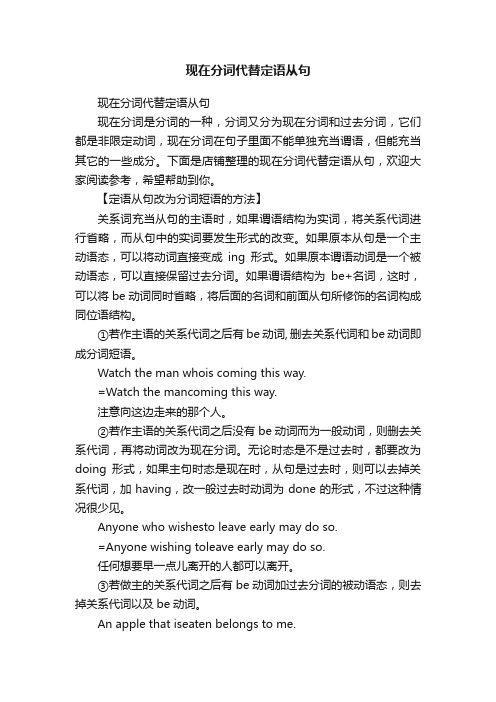
现在分词代替定语从句现在分词代替定语从句现在分词是分词的一种,分词又分为现在分词和过去分词,它们都是非限定动词,现在分词在句子里面不能单独充当谓语,但能充当其它的一些成分。
下面是店铺整理的现在分词代替定语从句,欢迎大家阅读参考,希望帮助到你。
【定语从句改为分词短语的方法】关系词充当从句的主语时,如果谓语结构为实词,将关系代词进行省略,而从句中的实词要发生形式的改变。
如果原本从句是一个主动语态,可以将动词直接变成ing形式。
如果原本谓语动词是一个被动语态,可以直接保留过去分词。
如果谓语结构为be+名词,这时,可以将be动词同时省略,将后面的名词和前面从句所修饰的名词构成同位语结构。
①若作主语的关系代词之后有be动词, 删去关系代词和be动词即成分词短语。
Watch the man whois coming this way.=Watch the mancoming this way.注意向这边走来的那个人。
②若作主语的关系代词之后没有be动词而为一般动词,则删去关系代词,再将动词改为现在分词。
无论时态是不是过去时,都要改为doing形式,如果主句时态是现在时,从句是过去时,则可以去掉关系代词,加having,改一般过去时动词为done的形式,不过这种情况很少见。
Anyone who wishesto leave early may do so.=Anyone wishing toleave early may do so.任何想要早一点儿离开的人都可以离开。
③若做主的关系代词之后有be动词加过去分词的被动语态,则去掉关系代词以及be动词。
An apple that iseaten belongs to me.=An apple eatenbeongs to me.这个被吃掉的苹果是我的。
【状语从句改为分词短语的方法】①先将引导状语从句的`连接词去掉。
②状语从句的主语与主句的主语相同时,再把状语从句的主语去掉, 如不相同则保留。
定语从句与分词的转化

★Study the model and change the attributive clauses into participles.This is the handbook which was introduced by the engineer.→This is the handbook introduced by the engineer.1.A letter which is posted today will probably reach him the day after tomorrow.2.He is a man who is loved by everyone.3.We have to pay taxes on goods which are imported from aboard.4.Posters which are printed can be seen everywhere.5.The book that was written in 1957 tells of the struggle of the miners.6.The material, which was discovered by accident, has saved many people’s lives.7.Any article that is left in these buses will be taken to the Lost Office at once.8.Any people who have broken the rules must be punished.9.A prosperity that had never seen before appeared in the countryside.10.Nearly half the 149 articles that were presented were new compositions.11.Plants that are raised in hot-houses are unlikely to be healthy enough.12.All the factories and shops that were built last year were Chinese-designed.13.This project, which was designed by Chinese engineers, was constructed in only two years and seven months.14.The river, which is polluted by the factories, looks terrible.15.These wives, who were attached to kitchens, had no personal spare time.16.The temple, which was burnt down in the sixteenth century, was never rebuilt.17.I hate to see letters which are written in pencil.18.We must keep a secret of the things that are being discussed here.19.Everyone was frightened by the mouse that was being chased by a cat.20.Do you like the eggs that are being fried in the pan?21.Can you see the boy who is being scolded by his roommates.22.The picture which is being painted will be sent to foreigners as a present.23.You are invited to our party that will be given at our institute at 7:30 pm Dec.2.24.The meeting that will be held next week is looked forward to by everyone.25.Who is willing to look after the deer that will be sent back to nature?★Observe the model carefully and deal with the rest in the same way.They were encouraged by these successes. They decided to do further research. →Encouraged by these successes, they decided to do further research.1.We were deeply moved by the movie. We wiped our tears off from time to time.2.The bridge was built in 1193. It is over 700 years old.3.The halls were lit by countless electric lights. The halls were as bright as day.4.Jack was injured in the accident. He was sent to hospital at once.5.Grace was told that the exam had begun. She was so anxious that she cried.6.He was much interested. He agreed to give it a try.7.The two young wives were delighted. They thought up many new ideas too.8.The mountains are covered by snow. They look very beautiful.9.Mary was made grateful. She thanked again and again.10.My father has been taught by mistakes and setbacks. He has become wiser.11.The boat sailed on. It was driven by a strong wind.12.The president entered the hall. He was followed by a couple of bodygugards.13.Granny was supported by a nurse. She went out into the garden.14.The tiger is kept in the cage. It can not escape.15.The horse is tied to a tall tree. It can not reach the grass around him.★Study the example and rewrite the following sentences.As he was born into a farmer family. He had only two years of schooling.→Born into a farmer family,he had only two years of schooling.1.As he was tired by the journey. He soon fell asleep.2.As they were fired by the boss. They had to hunt new jobs.3.Once the town was seen from the tower. It looks beautiful.4.If meat is kept in a fridge. It should remain edible for at least three months.5.When the boy was asked to make a speech in public. He became speechless.6.Though he has been beaten many times. He doesn’t remember his faults.7.If we are compared with you. We still have a long way to go.8.Once a tiger is set free. It will become a danger to people.9.While we were being shown around the school. We learned that some peoplewere there for exchange of experience.10.Ling Ming is the tallest if he is compared with other engineers.★Supply the correct form of the verb in these sentences.1.I have been watching the girls _____(cook).2.Did you see the boy________(fall)?3.Look at the rain ________(come) down.4.I never heard him ________(say) the word before.5.Did you noticed anyone __________(come) in?6.I would like to listen to birds__________(sing) in the wood.7.I can smell the cakes _________(cook).8.He felt a stone _________(hit) his back.9.I saw a light __________(burn) in his window.10.I heard someone _____________(knock) at the door.11.We watched him _________(get) on the truck and ___________(drive) away.12.Did you noticed anyone________(walk) behind you?13.She could feel the rain __________(beat) against her face.14.You mustn’t keep him _________(wait).15.Then he felt his hat ____________(blow) away.16.I’ve never heard the word __________(use) in spoken English.17.They often saw the boy_________(teach) by his teacher.18.I’ll have the book__________(bring) over to you.19.I’ll have someone___________(bring) the book over to you.20.Where did you get your watch _________(repair).21.I could see the trees ____________(reflect) in the swimming-pool.22.If you wish anything__________(change), please say so.23.He once heard the song _________(sing).24.He was glad to see her children ________(take care of ) in the kindergarten.25.He was surprised to find her room _____( clean) .26.When you talk, you should at least make yourself ________(understand).27.He wanted his eggs __________(fry).28.Once we caught him _______ ( sleep)in class.29.When I enter the room, I found him _________(read ) something aloud.30.They watched the sun ________ (set) behind the trees.31.You’ll find the topic___________(discuss) everywhere.32.As we went close to the village, we saw new houses ________(put up).★Join each pair of sentences and put one of them into a participial phrase.He rushed into the room. His face was covered with sweat.→He rushed into the room, his face covered with sweat.1.There a group of peasants were weeding the garden. Their trousers were rolled totheir knees.ter that autumn,he prepared to return to his institute. His work was finished.3.Her eyes were filled with tears. She didn’t see him enter.4.If all things are considered. Her paper is of great value than yours.5.Since the key is lost, we cannot go anywhere.6.He was lying on the grass. His hands were crossed under his head.7.She waited at the gate. Her bags were placed in a taxi.8.As the sun had set, we had to stop at the village for the night.9.They were wet with sweat. Their shirts were soaked through.10.All the compositions had been written and collected. The teacher sent the studentshome.总结一.过去分词也象现在分词一样来自定语从句、并列句或并列谓语、状语从句、SVOC句型和独立结构。
高一英语现在分词短语转定语从句练习题40题(答案解析)

高一英语现在分词短语转定语从句练习题40题(答案解析)1.The man standing by the window is my teacher.A.who is standing by the windowB.that is standing by the windowC.which is standing by the window答案解析:A。
现在分词短语“standing by the window”修饰“the man”,转化为定语从句应为“who is standing by the window”。
先行词“the man”是人,所以关系代词用“who”。
B 选项“that”一般不用来指人;C 选项“which”一般用来指物。
2.The book lying on the table is mine.A.which is lying on the tableB.that is lying on the tableC.who is lying on the table答案解析:A。
“lying on the table”修饰“the book”,转化为定语从句应为“which is lying on the table”。
先行词“the book”是物,关系代词用“which”或“that”,但这里没有“that”选项。
C 选项“who”用来指人。
3.The girl singing a song is very beautiful.A.who is singing a songB.that is singing a songC.which is singing a song答案解析:A。
“singing a song”修饰“the girl”,转化为定语从句应为“who is singing a song”。
先行词“the girl”是人,关系代词用“who”。
B 选项“that”一般不用来指特定的人,尤其是有“who”的情况下优先用“who”;C 选项“which”指物。
分词与从句的转换

分词的形式:(not ) doing现在分词的一般式(主动、进行)(not ) done过去分词的一般式(被动、完成)(not ) being done分词的进行被动式(被动、进行)(not ) having done分词的完成式(主动、完成)谓语与分词非谓语转换的一般原则do/does/didis/are doingwas/were doing--- doingis/are/was/were done --- doneis being done--- being donehas/have done--- having donehas/have been done --- (having been) done分词与从句的转换1 分词作定语,相当于定语从句1) The hospital was an oldbuilding that/which was built in 1931.--- The hospital was an old building built in 1931.2) Do you know the girl whois standing over there?--- Do you know the girl standing over there?3) The man who spoke to usthe other day has gone toLondon.--- The man speaking to us the other day has gone to London.4) He became inspired when he thought about helping ordinary people who were exposed to cholera.--- He became inspired when he thought about helping ordinary people exposed to cholera.5) He found that it came from the river which waspolluted by the dirty water--- He found that it came from the river pollutedby the dirty water.6) He immediately told the people in Broad Street who were astonished to remove the handle from the pump.--- He immediately told the astonished people inBroad Street to removethe handle from thepump.7) He found supporting evidence from two other deaths that were linked to the Broad Street outbreak.--- He found supporting evidence from two other deaths linked to the Broad Street outbreak.8) The building which is being built is a new hospital.--- The building being built is a new hospital.2.分词作状语,相当于状语从句:1) While I was waiting for thebus, I caught sight of her.--- (While)waiting for the bus, I caught sight of her.2) As he was educated by theparty, he became a great fighter.--- Educated by the party,he became a greatfighter.3) Because I hadn’t receivedan answer, I wrote to him again.--- Not having received an answer, I wrote to himagain.4) If we had been givenenough time, we could have done it better.--- If (having been) givenenough time, we couldhave done it better5) Though he had made greatachievements, he didn’t pride.--- Though having made great achievements, hedidn’t pride.2.分词作状语,相当于并列句或可以与with转换:1) He died, and left hisdaughter much money.--- He died, leaving his daughter much money.2) The teacher entered theclassroom, followed by his students.--- The teacher entered the classroom and hisstudents followed him.The teacher entered theclassroom and he wasfollowed by his studentsThe teacher entered theclassroom with hisstudents following him.3. 独立主格作状语,相当于状语从句.--- The shower being over,we continued ourjourney.disappointed.--- All the tickets (havingbeen) sold out,they wentaway disappointed.4. 分词做表语或宾补1) He got interested in the two theories explaining how cholera killed people.2) He became inspired when he thought about helping ordinary people.3) He was frightened and his mind was confused.4) He found that the windowswere broken.--- He found the windowsbroken.5) I found that my heart wasbeating fast at the news of bomb explosion.--- I found my heartbeating fast at the newsof bomb explosion.练习:1. A man was arrested by the police. What was his name? (合并成简单句)--- What was the name of the man arrested by the police?2.There is a young woman who is dressed in green. (改成简单句)--- There is a young woman dressed in green.3.The concert which was given by the band was a great success. (改成简单句)--- The concert given by the band was a great success.4.What’s the language spoken in that area? (改成复合句)--- What’s the language which/ that is spoken in that area?5.We’ve already reached the target set in the program. (改成复合句)--- We’ve already reached the target that / which was set in the program.6.站在门口的那个人是我的爸爸。
2024年高一英语现在分词短语转定语从句练习题30题

2024年高一英语现在分词短语转定语从句单选题30题1.The students playing basketball on the playground are from Class One.A.who play basketballB.that play basketballC.which play basketballD.whose play basketball答案:A。
现在分词短语“playing basketball on the playground”修饰students,表示正在操场上打篮球的学生。
定语从句“who play basketball on the playground”也修饰students,who 在定语从句中作主语,指人。
B 选项that 一般不用于指人。
C 选项which 用于指物。
D 选项whose 表示所属关系,不符合题意。
2.The girl singing a song in the classroom is very beautiful.A.who sings a songB.that sings a songC.which sings a songD.whose sings a song答案:A。
现在分词短语“singing a song in the classroom”修饰girl,表示在教室里唱歌的女孩。
定语从句“who sings a song in the classroom”也修饰girl,who 在定语从句中作主语,指人。
B 选项that 一般不用于指人。
C 选项which 用于指物。
D 选项whose 表示所属关系,不符合题意。
3.The books lying on the desk are mine.A.which lie on the deskB.that lie on the deskC.who lie on the deskD.whose lie on the desk答案:A。
高一英语现在分词短语转定语从句练习题40题(带答案)
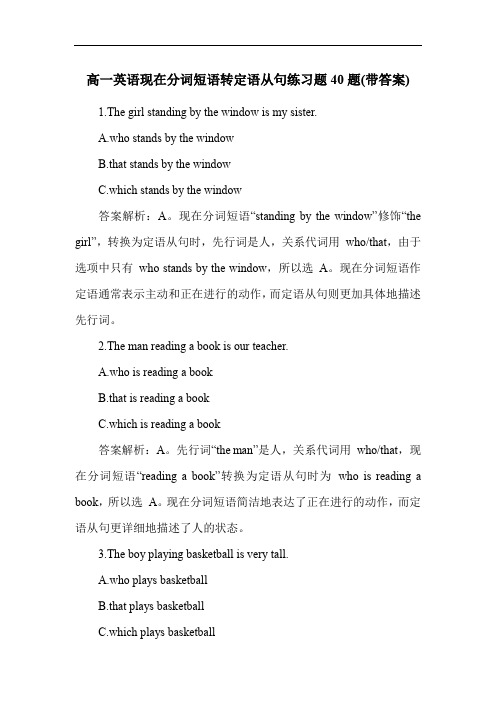
高一英语现在分词短语转定语从句练习题40题(带答案)1.The girl standing by the window is my sister.A.who stands by the windowB.that stands by the windowC.which stands by the window答案解析:A。
现在分词短语“standing by the window”修饰“the girl”,转换为定语从句时,先行词是人,关系代词用who/that,由于选项中只有who stands by the window,所以选A。
现在分词短语作定语通常表示主动和正在进行的动作,而定语从句则更加具体地描述先行词。
2.The man reading a book is our teacher.A.who is reading a bookB.that is reading a bookC.which is reading a book答案解析:A。
先行词“the man”是人,关系代词用who/that,现在分词短语“reading a book”转换为定语从句时为who is reading a book,所以选A。
现在分词短语简洁地表达了正在进行的动作,而定语从句更详细地描述了人的状态。
3.The boy playing basketball is very tall.A.who plays basketballB.that plays basketballC.which plays basketball答案解析:A。
先行词“the boy”是人,关系代词用who/that,现在分词短语“playing basketball”转换为定语从句时为who plays basketball,所以选A。
现在分词短语突出动作,定语从句更全面地描述人。
4.The woman singing a song is beautiful.A.who sings a songB.that sings a songC.which sings a song答案解析:A。
【免费下载】现在分词与定语从句转换
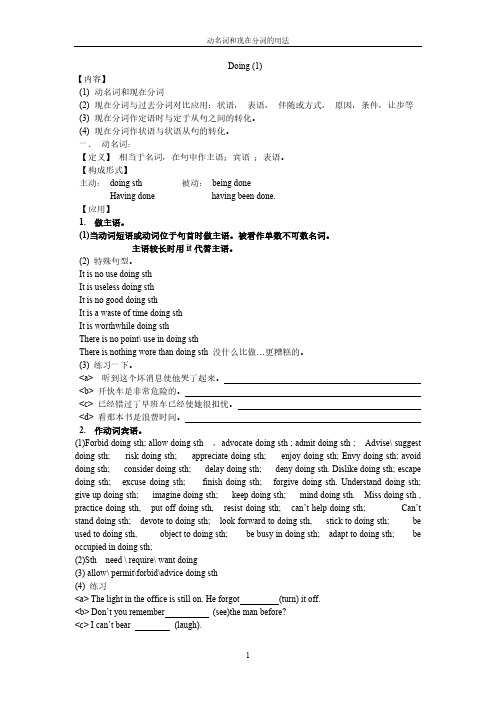
It is a waste of time doing sth
It is worthwhile doing sth
There is no point\ use in doing sth
There is nothing wore than doing sth 没什么比做…更糟糕的。
(3) 练习一下。
<a> 听到这个坏消息使他哭了起来。
(4) what\ how about doing sth (征求意见)
(5)go + shopping\ swimming\ camping\ climbing\hiking\ running\skating\ walking\
sightseeing\dancing\ fishing\ riding\ jogging\ hunting\ driving\ boating ……
<b> 开快车是非常危险的。
<c> 已经错过了早班车已经使她很担忧。
<d> 看那本书是浪费时间。
2. 作动词宾语。
(1)Forbid doing sth; allow doing sth ,advocate doing sth ; admit doing sth ; Advise\ suggest
doing sth; risk doing sth; appreciate doing sth; enjoy doing sth; Envy doing sth; avoid
doing sth; consider doing sth; delay doing sth; deny doing sth. Dislike doing sth; escape
doing sth; excuse doing sth; finish doing sth; forgive doing sth. Understand doing sth;
现在分词作定语从句

现在分词作定语从句现在分词作定语从句现在分词是分词的一种,分词又分为现在分词和过去分词,它们都是非限定动词,现在分词在句子里面不能单独充当谓语,但能充当其它的一些成分。
下面是店铺为大家整理的现在分词作定语从句,供大家参考借鉴,希望可以帮助到有需要的朋友。
现在分词作定语从句I.ing 形式作定语1. 现在分词作前置定语时,在逻辑上与所修饰的名词之间为主谓关系,也可改成定语从句;如果与所修饰的名词之间没有主谓关系,定语相当于一个介词for引导的短语。
现在分词位于所修饰的名词之后做后置定语,与所修饰的名词之间呈逻辑上的主谓关系,相当于一个定语从句。
如:a listening child= a child who is listening, a walking stick= a stick for walking.2. 现在分词作定语往往表示“令人”,主动的或正在进行的动作。
如:a moving film, a developing country.II. ing 形式作状语动词-ing形式在句子中做状语,表示的动作是主语动作的一部分,与谓语动词表示的动作或状态是同时或者几乎同时发生的,经常可以做时间、原因、方式、条件、结果、目的、让步状语从句。
句子的主语必须是状语的逻辑主语;而且主语与作状语的分词之间呈逻辑上的主谓关系。
1.原因状语,相当于原因状语从句。
1).Being ill, she didn’t go to school today.因为生病,她今天没上学去。
2). Seeing no one at home, I decided to come again.看见没有人在家,我决定再来一趟。
2. 时间状语,相当于when, while等引导的从句。
1).Hearing the good news, he jumped with joy.当听到这个好消息时,他高兴地跳了起来。
2).Walking in the street, I saw a friend of mine.当我走在街上时,我看到了我的朋友。
定语从句与分词短语的转换
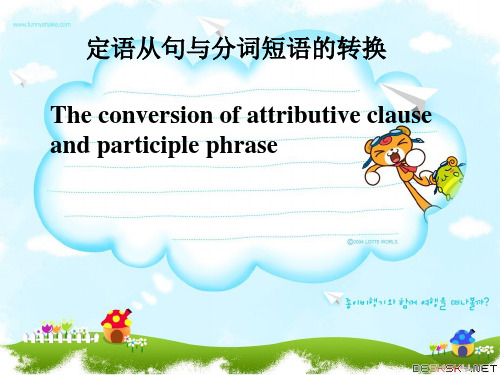
定语从句转换成现在分词短语做后置定语, 有主动或进行的意思。先行词与现在分词
有主动关系
• The boys who are playing tennis are my friends. • The boys playing tennis are my friends. • I know the boy who is running in the park. • I know the boy running in the park
用定语从句完成下列句子.
The man standing under under 1. The man is my brother. He is standing The man who is standing the tree under the tree. _____________________. is my brother the tree is my brother.
Fill in the blanks with proper participles
• 1. The scientist _________ us a talk just now is giving from Tsinghua University. (give) • 2. The teacher followed by her students came ________ in. (follow) singing • 3. The girl ________ for us at the party is Tom’s sister. • (sing) performed • 4. The play ___________ last night was written by Shakespeare. (perform) shown • 5. I love the movie ________ on TV last night. (show)
现在分词与定语从句转换资料

现在分词与定语从句转换Doing (1)【内容】(1)动名词和现在分词(2)现在分词与过去分词对比应用:状语,表语,伴随或方式,原因,条件,让步等(3)现在分词作定语时与定于从句之间的转化。
(4)现在分词作状语与状语从句的转化。
一.动名词:【定义】相当于名词,在句中作主语;宾语;表语。
【构成形式】主动: doing sth 被动: being doneHaving done having been done.【应用】1.做主语。
(1)当动词短语或动词位于句首时做主语。
被看作单数不可数名词。
主语较长时用it代替主语。
(2) 特殊句型。
It is no use doing sthIt is useless doing sthIt is no good doing sthIt is a waste of time doing sthIt is worthwhile doing sthThere is no point\ use in doing sthThere is nothing wore than doing sth 没什么比做…更糟糕的。
(3) 练习一下。
<a> 听到这个坏消息使他哭了起来。
<b> 开快车是非常危险的。
<c> 已经错过了早班车已经使她很担忧。
<d> 看那本书是浪费时间。
2.作动词宾语。
(1)Forbid doing sth; allow doing sth ,advocate doing sth ; admit doing sth ; Advise\ suggest doing sth; risk doing sth; appreciate doing sth; enjoy doing sth; Envy doing sth; avoid doing sth; consider doing sth; delay doing sth; deny doing sth. Dislike doing sth; escape doing sth; excuse doing sth; finish doing sth; forgive doing sth. Understand doing sth; give up doing sth; imagine doing sth; keep doing sth; mind doing sth. Miss doing sth , practice doing sth, put off doing sth, resist doing sth; can’t help doing sth; Can’t stand doing sth; devote to doing sth; look forward to doing sth, stick to doing sth; be used to doing sth, object to doing sth; be busy in doing sth; adapt to doing sth; be occupied in doing sth;(2)Sth need \ require\ want doing(3) allow\ permit\forbid\advice doing sth(4) 练习<a> The light in the office is still on. He forgot (turn) itoff.<b> Don’t you remember (see)the man before?<c> I can’t bear (laugh).<d> you will forbid (photograph) in the park.= you will in the park.<e> Your composition needs (correct) .= Your composition needs .做介词宾语(1) 动词 + 介词 + doing sthBe used to doing ; be related to doing; get down to doing ; be givento doing =be addicted to doing ; put one’s mind to doing ; giverise to (引起); be equal to doing sth ; devote one’s to doing sth ;lead to doing sth; object to doing ; look forward to doing sth; beopposed to doing sth ; stop\ keep\ prevent sb from doingh sth;protect sb from doing sth; forbid sb from doing sth; Remind sb ofdoing sth ; Warn sb of doing sth ; Rob sb of doing sth; inform sb ofdoing sth ; accuse sb of doing sth ; feel like doing sth.(2) 形容词 + 介词 +doing sthBe busy in doing ; be occupied in; be interested in ; be responsiblefor doing sth..(3) 主语+ have + fun\ pleasure \a good time\ trouble \ difficulty \problem in doing sth;have no hesitation in doing sth(4) what\ how about doing sth (征求意见)(5)go + shopping\ swimming\ camping\ climbing\hiking\running\skating\ walking\ sightseeing\dancing\ fishing\ riding\jogging\ hunting\ driving\ boating ……练习<a> I used to (get) up late , but now I am used to(get) up early.<b> The rain prevented us from (go) out .<c> She objects to (marry) me.<d> 你对打篮球感兴趣吗?<e> 我读懂他有困难。
- 1、下载文档前请自行甄别文档内容的完整性,平台不提供额外的编辑、内容补充、找答案等附加服务。
- 2、"仅部分预览"的文档,不可在线预览部分如存在完整性等问题,可反馈申请退款(可完整预览的文档不适用该条件!)。
- 3、如文档侵犯您的权益,请联系客服反馈,我们会尽快为您处理(人工客服工作时间:9:00-18:30)。
(2) 形容词 + 介词 +doing sth Be busy in doing ; be occupied in; be interested in ; be responsible for doing sth..
(3) 主语+ have + fun\ pleasure \a good time\ trouble \ difficulty \ problem in doing sth ;have no hesitation in doing sth
occupied in doing sth;
(2)Sth need \ require\ want doing
(3) allow\ permit\forbid\advice doing sth
(4) 练习
<a> The light in the office is still on. He forgot
Can’t
stand doing sth; devote to doing sth; look forward to doing sth, stick to doing sth;
be
used to doing sth,
object to doing sth; be busy in doing sth; adapt to doing sth; be
动名词和现在分词的用法
Doing (1)
【内容】
(1) 动名词和现在分词
(2) 现在分词与过去分词对比应用:状语, 表语, 伴随或方式, 原因,条件,让步等
(3) 现在分词作定语时与定于从句之间的转化。
(4) 现在分词作状语与状语从句的转化。
一. 动名词:
【定义】 相当于名词,在句中作主语;宾语 ;表语。
Having done
having been done.
【应用】
1. 做主语。
(1)当动词短语或动词位于句首时做主语。被看作单数不可数名词。
主语较长时用 it 代替主语。
(2) 特殊句型。
It is no use doing sth
It is useless doing sth
It is no good doing sth
(correct) . .
Be used to doing ; be related to doing; get down to doing ; be given to doing =be addicted to doing ; put one’s mind to doing ; give rise to (引起); be equal to doing sth ; devote one’s to doing sth ; lead to doing sth; object to doing ; look forward to doing sth; be opposed to doing sth ; stop\ keep\ prevent sb from doingh sth; protect sb from doing sth; forbid sb from doing sth; Remind sb of doing sth ; Warn sb of doing sth ; Rob sb of doing sth; inform sb of doing sth ; accuse sb of doing sth ; feel like doing sth.
(4) what\ how about doing sth (征求意见)
(5)go + shopping\ swimming\ camping\ climbing\hiking\ running\skating\ walking\
sightseeing\dancing\ fishing\ riding\ jogging\ hunting\ driving\ boating ……
【构成形式】
主动: doing sth
被动: being done
对全部高中资料试卷电气设备,在安装过程中以及安装结束后进行高中资料试卷调整试验;通电检查所有设备高中资料电试力卷保相护互装作置用调与试相技互术关,系电通,力1根保过据护管生高线0产中不工资仅艺料可高试以中卷解资配决料置吊试技顶卷术层要是配求指置,机不对组规电在范气进高设行中备继资进电料行保试空护卷载高问与中题带资22负料,荷试而下卷且高总可中体保资配障料置23试时23卷,各调需类控要管试在路验最习;大题对限到设度位备内。进来在行确管调保路整机敷使组设其高过在中程正资1常料中工试,况卷要下安加与全强过,看2度并55工且22作尽2下可护1都能关可地于以缩管正小路常故高工障中作高资;中料对资试于料卷继试连电卷接保破管护坏口进范处行围理整,高核或中对者资定对料值某试,些卷审异弯核常扁与高度校中固对资定图料盒纸试位,卷置编工.写况保复进护杂行层设自防备动腐与处跨装理接置,地高尤线中其弯资要曲料避半试免径卷错标调误高试高等方中,案资要,料求编5试技写、卷术重电保交要气护底设设装。备备4置管高调、动线中试电作敷资高气,设料中课并3技试资件且、术卷料拒管中试试调绝路包验卷试动敷含方技作设线案术,技槽以来术、及避管系免架统不等启必多动要项方高方案中式;资,对料为整试解套卷决启突高动然中过停语程机文中。电高因气中此课资,件料电中试力管卷高壁电中薄气资、设料接备试口进卷不行保严调护等试装问工置题作调,并试合且技理进术利行,用过要管关求线运电敷行力设高保技中护术资装。料置线试做缆卷到敷技准设术确原指灵则导活:。。在对对分于于线调差盒试动处过保,程护当中装不高置同中高电资中压料资回试料路卷试交技卷叉术调时问试,题技应,术采作是用为指金调发属试电隔人机板员一进,变行需压隔要器开在组处事在理前发;掌生同握内一图部线纸故槽资障内料时,、,强设需电备要回制进路造行须厂外同家部时出电切具源断高高习中中题资资电料料源试试,卷卷线试切缆验除敷报从设告而完与采毕相用,关高要技中进术资行资料检料试查,卷和并主检且要测了保处解护理现装。场置设。备高中资料试卷布置情况与有关高中资料试卷电气系统接线等情况,然后根据规范与规程规定,制定设备调试高中资料试卷方案。
It is a waste of time doing sth
It is worthwhile doing sth
There is no point\ use in doing sth
There is nothing wore than doing sth 没什么比做…更糟糕的。
(3) 练习一下。
<a> 听到这个坏消息使他哭了起来。
doing sth; consider doing sth; delay doing sth; deny doing sth. Dislike doing sth; escape
doing sth; excuse doing sth; finish doing sth; forgive doing sth. Understand doing sth;
(turn) it off.
<b> Don’t you remember
(see)the man before?
<c> I can’t bear
(laugh).
1
对全部高中资料试卷电气设备,在安装过程中以及安装结束后进行高中资料试卷调整试验;通电检查所有设备高中资料电试力卷保相护互装作置用调与试相技互术关,系电通,力1根保过据护管生高线0产中不工资仅艺料可高试以中卷解资配决料置吊试技顶卷术层要是配求指置,机不对组规电在范气进高设行中备继资进电料行保试空护卷载高问与中题带资22负料,荷试而下卷且高总可中体保资配障料置23试时23卷,各调需类控要管试在路验最习;大题对限到设度位备内。进来在行确管调保路整机敷使组设其高过在中程正资1常料中工试,况卷要下安加与全强过,看2度并55工且22作尽2下可护1都能关可地于以缩管正小路常故高工障中作高资;中料对资试于料卷继试连电卷接保破管护坏口进范处行围理整,高核或中对者资定对料值某试,些卷审异弯核常扁与高度校中固对资定图料盒纸试位,卷置编工.写况保复进护杂行层设自防备动腐与处跨装理接置,地高尤线中其弯资要曲料避半试免径卷错标调误高试高等方中,案资要,料求编5试技写、卷术重电保交要气护底设设装。备备4置管高调、动线中试电作敷资高气,设料中课并3技试资件且、术卷料拒管中试试调绝路包验卷试动敷含方技作设线案术,技槽以来术、及避管系免架统不等启必多动要项方高方案中式;资,对料为整试解套卷决启突高动然中过停语程机文中。电高因气中此课资,件料电中试力管卷高壁电中薄气资、设料接备试口进卷不行保严调护等试装问工置题作调,并试合且技理进术利行,用过要管关求线运电敷行力设高保技中护术资装。料置线试做缆卷到敷技准设术确原指灵则导活:。。在对对分于于线调差盒试动处过保,程护当中装不高置同中高电资中压料资回试料路卷试交技卷叉术调时问试,题技应,术采作是用为指金调发属试电隔人机板员一进,变行需压隔要器开在组处事在理前发;掌生同握内一图部线纸故槽资障内料时,、,强设需电备要回制进路造行须厂外同家部时出电切具源断高高习中中题资资电料料源试试,卷卷线试切缆验除敷报从设告而完与采毕相用,关高要技中进术资行资料检料试查,卷和并主检且要测了保处解护理现装。场置设。备高中资料试卷布置情况与有关高中资料试卷电气系统接线等情况,然后根据规范与规程规定,制定设备调试高中资料试卷方案。
give up doing sth; imagine doing sth; keep doing sth; mind doing sth. Miss doing sth ,
practice doing sth, put off doing sth, resist doing sth; can’t help doing sth;
<b> 开快车是非常危险的。
<c> 已经错过了早班车已经使她很担忧。
